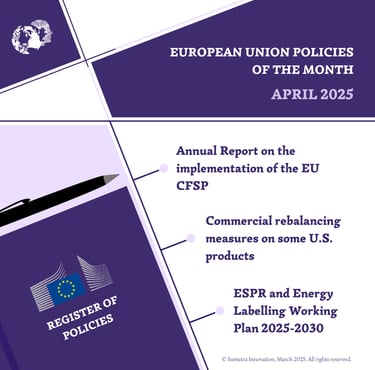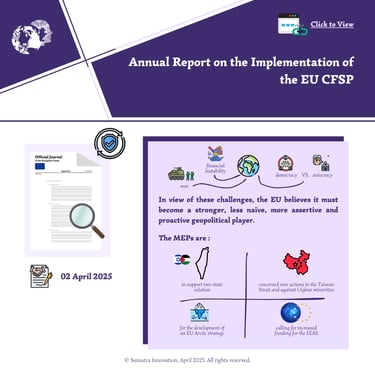Register of Policies / April 2025



1/ Annual Report on the implementation of the EU CFSP
This non-binding political resolution adopted by the European Parliament on April 2nd, 2025, examines and comments on how the EU conducted its Common Foreign and Security Policy (CFSP) in 2024, and sets out recommendations and policy priorities for 2025. In a global context of instability and systemic competition between democracies and autocracies, the EU believes it must become a stronger, less naïve, more assertive and proactive geopolitical player. This resolution is therefore a strategic political statement that sets the tone for this year, and will influence the EU's future actions and decisions within the CSDP and CFSP frameworks. In their report, MEPs focus on strengthening transatlantic ties and partnerships with southern democracies. In the MENA region, Parliament stresses the need to strengthen the EU's presence and strategy in the southern Mediterranean and Sahel regions, and insists on support for a two-state solution that respects the rights of Israel and Palestine. China is condemned for its actions in the Taiwan Strait and against Uighur minorities, and a more coordinated EU Indo-Pacific strategy should be put in place. MEPs also call for increased funding for the EEAS, and the development of an independent and more autonomous EU foreign policy, from which an EU Arctic strategy should emerge.
2/ Commercial rebalancing measures concerning certain products originating from the USA
In response to the reintroduction and extension of US tariffs on steel, aluminum and derivatives from the EU, which covered additional products beyond the original scope, the EU introduced measures to restore trade balance. The EU considered these tariffs a clear violation of the 2022 WTO commitments and, following failed consultations under the WTO Dispute Settlement Mechanism, legally decided to reintroduce and extend counter-tariffs on products originating in the United States. The products include steel, aluminum, agricultural products, textiles, shoes, chemicals, cosmetics and machinery. The 25% ad valorem tariffs will apply to the majority of the new tariffs from May 16, 2025 and to other products from December 1, 2025. It is not just a simple retaliatory measure against something the Europeans consider illegal. It is about multiple objectives, such as maintaining influence in transatlantic trade relations, protecting strategic sectors, defending WTO-based multilateralism and avoiding a precedent in which “national security” is misused as a pretext for pure economic protectionism.
3/ ESPR and Energy Labelling Working Plan 2025 - 2030
The Ecodesign Working Plan 2025-2030 is part of the European transition to a greener, circular and competitive economy and aligns key EU policies (e.g., Green Deal, Circular Economy Action Plan, Clean Industrial Deal, EU Competitiveness Compass) to make sustainable products the norm, decarbonize industry and empower consumers. At the same time, it aims to help the Union remain globally competitive, as European industry needs to innovate and adapt quickly to avoid being overtaken in green technologies in the face of growing global competition, particularly with China. The non-binding strategy implements the new EU legislation on ecodesign, i.e., the Ecodesign for Sustainable Products Regulation (ESPR) and the Energy Labelling Framework Regulation (ELFR), for the period 2025-2030. The products are divided into different categories (end products, intermediate products, energy-related products), each of which has its own targets and focus areas. The Working Plan also introduces new mechanisms, such as the Digital Product Passport, an electronic record of sustainability information (materials used, reparability, recyclability, carbon footprint), and updates others, such as the extension of energy labels and ecodesign requirements.
EU law: Communication (2025)/187







